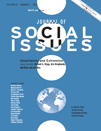Cultural values and norms that promote rigid thinking are related to a greater number of terrorist attacks or fatalities, according to a new article by researchers from the National Consortium for the Study of Terrorism and Responses to Terrorism (START). Societies that have the belief that one’s destiny and life events are predetermined (fatalism), have very strong norms and severe punishments for deviation from norms (cultural tightness), and those that privilege masculinity and have very distinct gender roles (low gender egalitarianism) have higher terrorism rates than those that are low on these dimensions.
In “Culture and Extremism,” the researchers found that those cultural factors predicted terrorism even when accounting for economic and religious factors and that those different cultural variables were related to different measures of terrorism. While gender egalitarianism and  fatalism were related to the overall number of incidents and fatalities, cultural tightness was related to the number of fatalities per incident, a variable that can be seen as the most “extreme” or lethal of terrorism rates.
fatalism were related to the overall number of incidents and fatalities, cultural tightness was related to the number of fatalities per incident, a variable that can be seen as the most “extreme” or lethal of terrorism rates.
“It is possible that low gender egalitarianism affords a culture that permits violent behavior in general due to the enhanced masculinity and toughness, which can spark violence even when minor provocations are present – or in the case of terrorism, grievances – resulting in a greater number of incidents and fatalities,” said Michele Gelfand, START researcher and professor of psychology at the University of Maryland.
Fatalism and cultural tightness also have unique relationships with terrorism rates. The authors assert that fatalism may create a context that encourages more willingness to engage in violent behaviors because it’s believed that others (i.e. god, fate, chance) control fate, thus superseding a sense of personal responsibility.
The researchers also speculate that the high degrees of monitoring and suppression, and much stronger punishments, exhibited by culturally tight nations may contribute to the higher number of fatalities per incident because the means needed to air one’s grievances in such societies needs to be more extreme or radical.
Gelfand and her coauthors – Gary LaFree, Susan Fahey and Emily Feinberg – examined how cultural dimensions related to the more than 80,000 terrorist attacks recorded in START’s Global Terrorism Database between 1970 and 2007.
The article is published in Journal of Social Issues at http://onlinelibrary.wiley.com/doi/10.1111/josi.12026/abstract.
